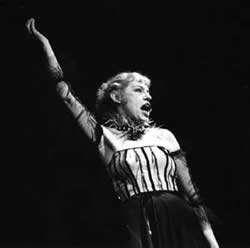Pirate Jenny

And this afternoon it will be quiet at the dock
When they're asking which ones have to die.
And there you'll hear me saying: ALL OF THEM.
And then, when the head falls, I'll say: HOPPLA.
And the ship with eight sails
And with fifty cannons
Disappears with me.
Alternatively known as "The Black Freighter", and as "Seeräuber-Jenny" / "Träume eines Küchenmädchens" in the original German.
The Pirate Jenny is a song by Bertolt Brecht. Several years after writing it, Brecht included the song in his 1928 play The Threepenny Opera (where it's told either by Polly Peachum or by Jenny the whore, depending on the production). Because of its intentionally high Applicability, activists and artists have used the story to convey a wide range of political ideas. The song has been constantly re-adapted since its first American performance in 1954, with its interpretation varying from anti-racism to symbolism for the atom bomb.
The story is about a young hotel maid named Jenny who dreams of one day being rescued by pirates from her demeaning job. When the pirates come (on a ship with eight sails and fifty cannons) they'll burn the town down, bringing everyone in the town to Jenny, who decides whether they live or die. Or, in the American version, when they die. She decides everyone should be killed, and with a final "HOPPLA!", she'll board the ship and sail away.
Interpretations of the poem tend to fall into two categories: the Jenny character is either a total angel who brings a much-needed social revolution, or a morally ambiguous Villain Protagonist whose actions should be sharply criticized. Some adaptations additionally show Jenny as a whore or a sex slave -- this is because the American version of The Threepenny Opera combined the characters of the Pirate Jenny and Jenny the whore, played by Miss Lotte Lenya (pictured above).
It should be noted that Kurt Weill didn't write the music for this particular song: he only orchestrated Brecht's original melody.
Comic Books
- In Watchmen, the plot is occasionally interrupted to show chapters from the pirate comic "The Black Freighter". Moore has said that the Jenny-story is meant to mirror both Rorschach's estrangement from humanity and Jon "marooning himself" on Mars, and most of all, Ozymandias' destruction of New York.
- In Alan Moore's later League of Extraordinary Gentlemen: Century 1910, the story is re-told starring Janni Nemo as "Jenny Diver".
- Anarchy Comics once ran an illustrated version of the poem. Hilariously, the author apparently didn't have access to a text version, and transcribed it by ear. It contains more mistakes than accurate lines.
Film
- Lars von Trier's Dogville is based entirely on the Pirate Jenny. The main character, Grace, even quotes the song directly at one point ("Nobody gonna sleep here tonight") and is shocked when she realizes what she is saying. The narrator notes that she wonders where such words would come from.
Literature
- Bertolt Brecht re-used the song himself in The Threepenny Novel.
Music
- Bob Dylan's "When The Ship Comes In" is based on the song, as is "The Times They Are A-Changin" (though less obviously so).
- Nina Simone transformed the story into a protest song against racism.
- "Geni e o Zepelim" by Chico Buarque tells the story of Geni, a young prostitute, who is despised by the populace. Her town is attacked by a zeppelin due to its wickedness. The Zeppelin's captain is charmed by Geni, though, and decides to spare the city if he could sleep with her. All the people beg for her to do that, telling her she would redeem them. She accepts, and has a terrible night with the commander. Even though she saves the town, as soon as the zeppelin leaves, the cityfolk resume their loathing for Geni.
- Swiss industrial band The Young Gods covered it on their album Play Kurt Weill, sung by an obviously male singer.
- The Mountain Goats song "Jenny" is a fairly obvious reference to Pirate Jenny.
Webcomics
- These two Cat and Girl strips.